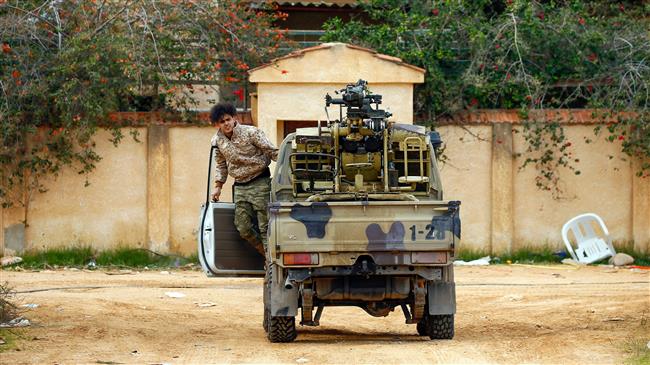Russia objects to UN draft resolution on Libya
Russia has blocked a United Nations Security Council draft resolution on the Libyan conflict, insisting that any foreign militants in Libya be labeled “foreign terrorist fighters,” not just “mercenaries,” as the draft text proposed.
Vassily Nebenzia, the Russian ambassador to the UN, raised objection to the British-drafted resolution on Wednesday, saying that, “This resolution does not take into account our concerns, and our vision how it should be. There are a lot of FTFs (foreign terrorist fighters) in Libya.”
At the end of a summit in the German capital of Berlin on January 19, key players and foreign powers involved in the Libyan crisis agreed on a 55-point road map to end the long-running conflict in Libya.
The proposed Security Council resolution underlined the resolve of all participants at the Berlin meeting to support a ceasefire, refrain from interfering in Libya’s conflict, abide by a UN arms embargo on the African country, and withdraw all “mercenaries” involved in the fighting.
“There are a few sections in the resolution that are of concern,” Nebenzia said. “We decided to continue our discussions with others.”
The objection raised by Russia cast doubt on whether a Security Council vote on the text would occur by the weekend.
“Talks continue,” said Karen Pierce, the British ambassador to the UN. “We would like as far as possible to have unity on the text.” Pierce stressed that UN Secretary-General Antonio Guterres has requested a vote on the matter as soon as possible.
The UN chief said on Tuesday that he was deeply frustrated with the escalation in the fighting in Libya.
Since 2014, Libya has been divided between two rival camps, the internationally-recognized government in the capital, Tripoli, and another in the eastern city of Tobruk, which is militarily supported by rebels under the command of a general named Khalifa Haftar.
Haftar’s forces have attacked Tripoli to unseat the government but have been bogged down on the capital’s outskirts.
The warring sides each receive patronage from several foreign countries, and Haftar has in the past been supported by Moscow.
Meanwhile, Turkey, which supports the Libyan government, has reportedly sent allied anti-government militants to Libya. Syria’s official news agency SANA, citing informed sources, said in a recent report that roughly 2,000 members of Turkish-backed militants in Syria had reportedly arrived in Libya.
The sources said that Turkish forces were also recruiting militants in the Kurdish-populated city of Afrin and other areas in northern Syria to send them to Libya.
Moreover, British daily newspaper The Guardian reported last month that some 650 fighters from Turkish-backed militant outfits in Syria are in Libya already, and a further 1,350 crossed to Turkey in January to support the Tripoli government.
Turkey has also formerly planned to send troops to Libya.
The important of Venezuela for Iran
Iran beats traditional rival Russia in freestyle and Greco-Roman wrestling friendly
Rape trials trigger protests against French ‘sexist and misogynistic’ culture
US photographer opens Berlin exhibition with anti-Israel speech
VIDEO | Press TV's News Headlines
VIDEO | US 'non-profit killer’ bill targets pro-Palestinian groups
Explainer: How Yemeni military chased away US aircraft carrier from Red Sea?
French march for women of Palestine













 This makes it easy to access the Press TV website
This makes it easy to access the Press TV website